《状元之路》2014届高考英语(全国通用)二轮复习钻石卷——早读晚练3-6
文档属性
| 名称 | 《状元之路》2014届高考英语(全国通用)二轮复习钻石卷——早读晚练3-6 | 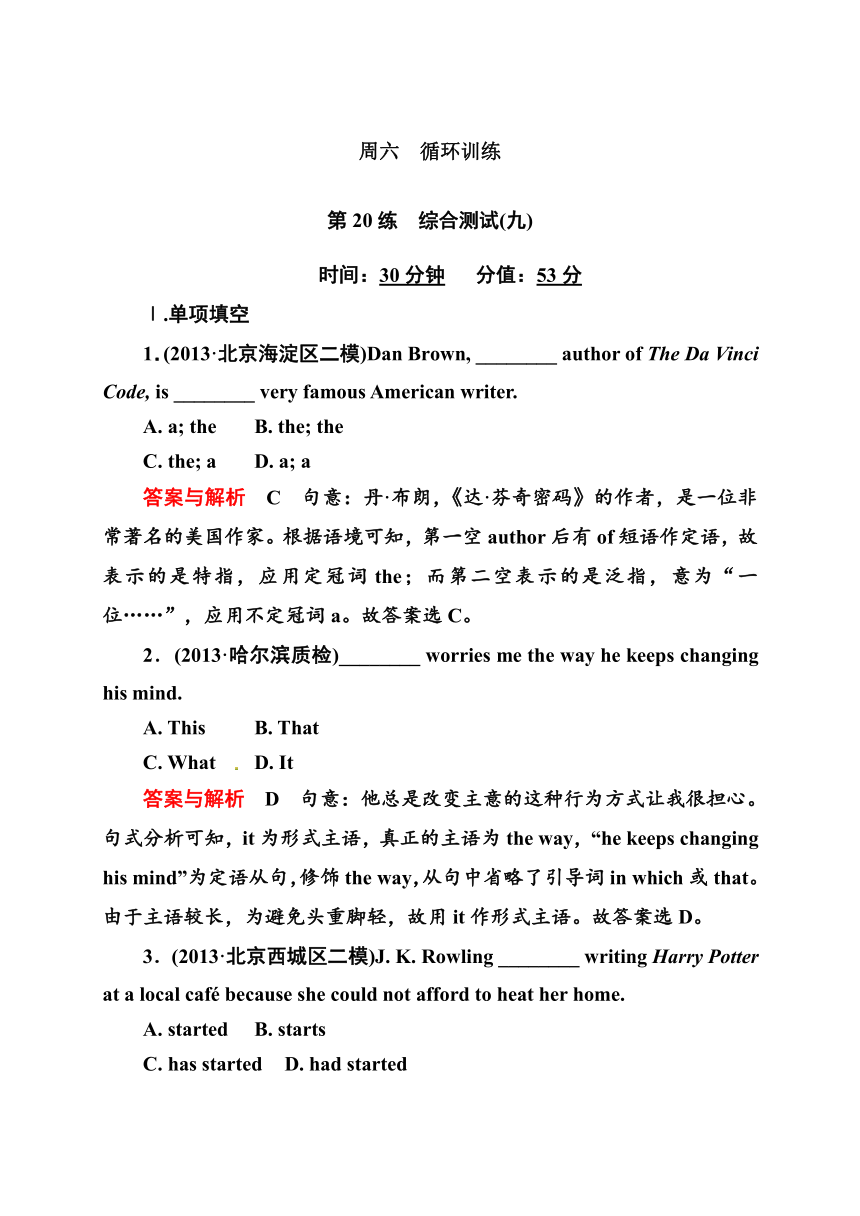 | |
| 格式 | zip | ||
| 文件大小 | 21.8KB | ||
| 资源类型 | 教案 | ||
| 版本资源 | |||
| 科目 | 英语 | ||
| 更新时间 | 2014-01-31 09:11:19 | ||
图片预览

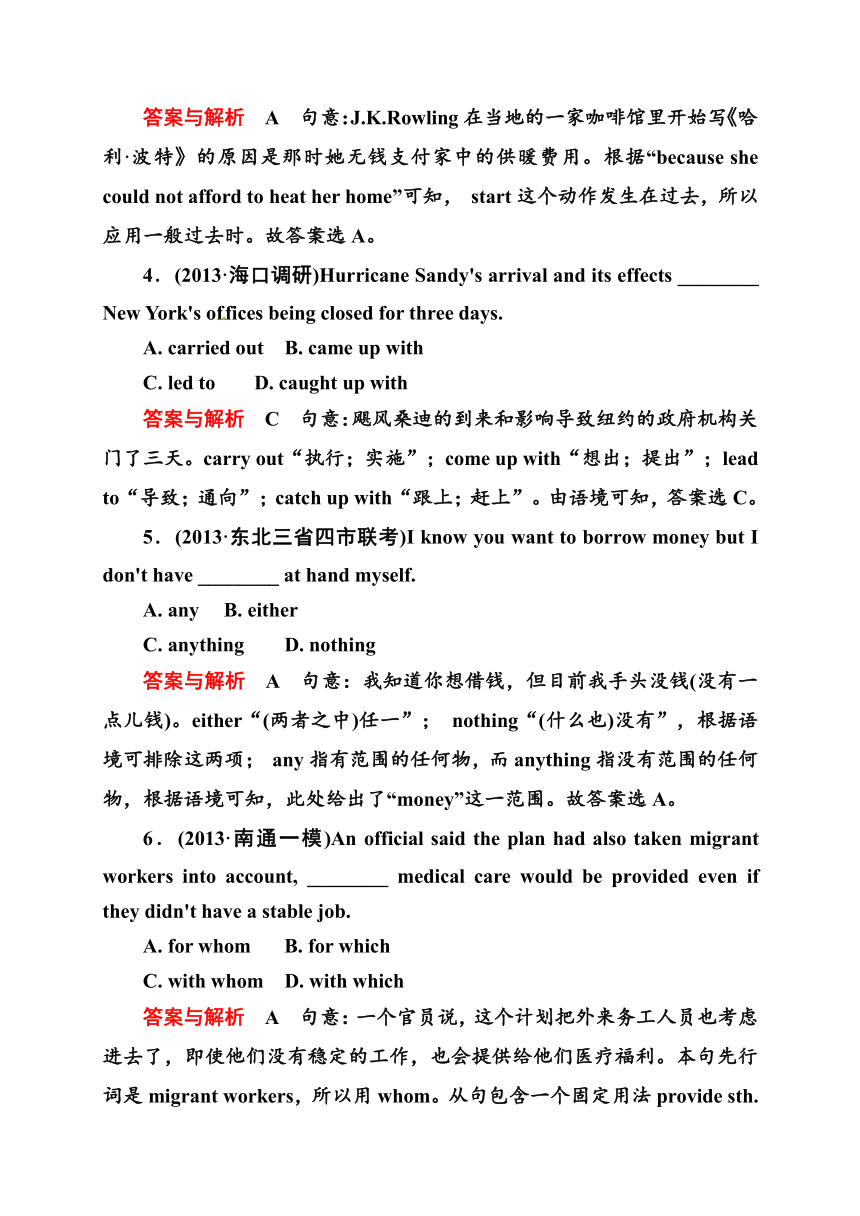
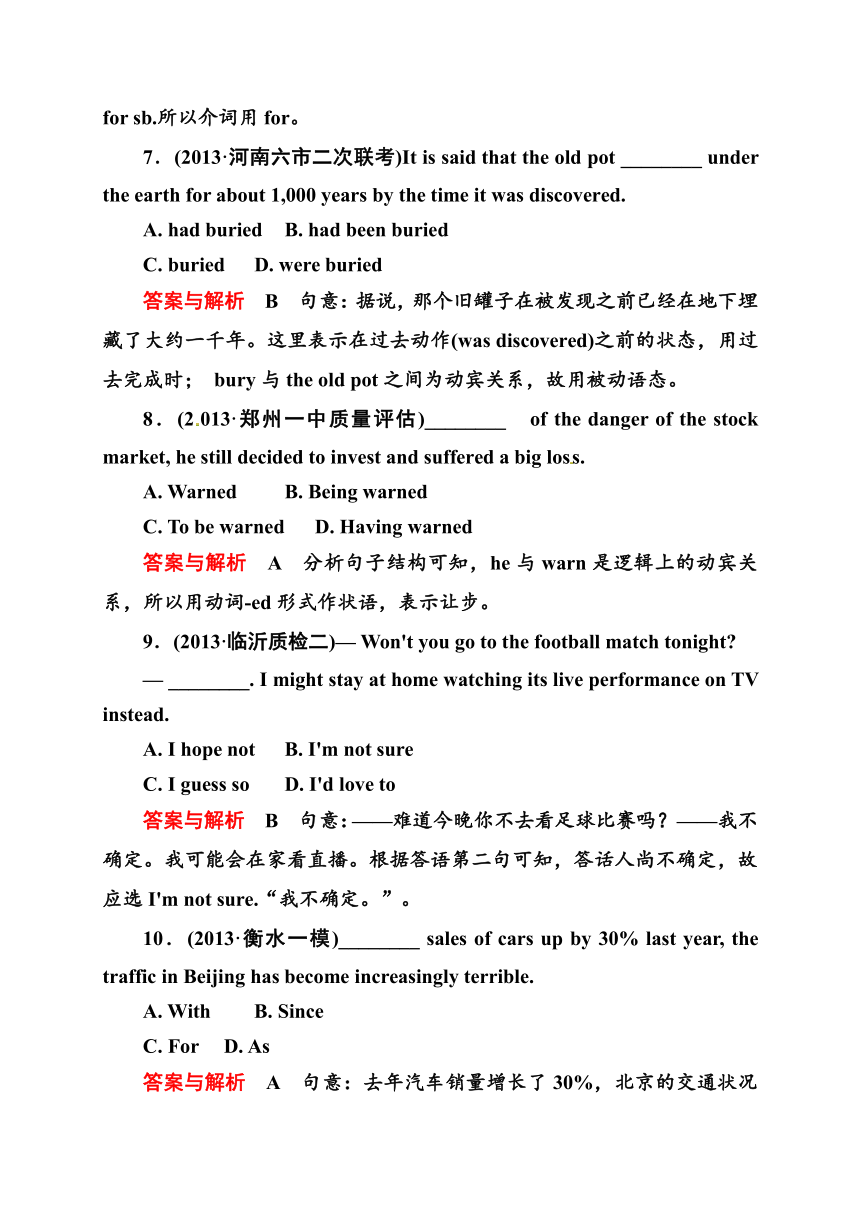
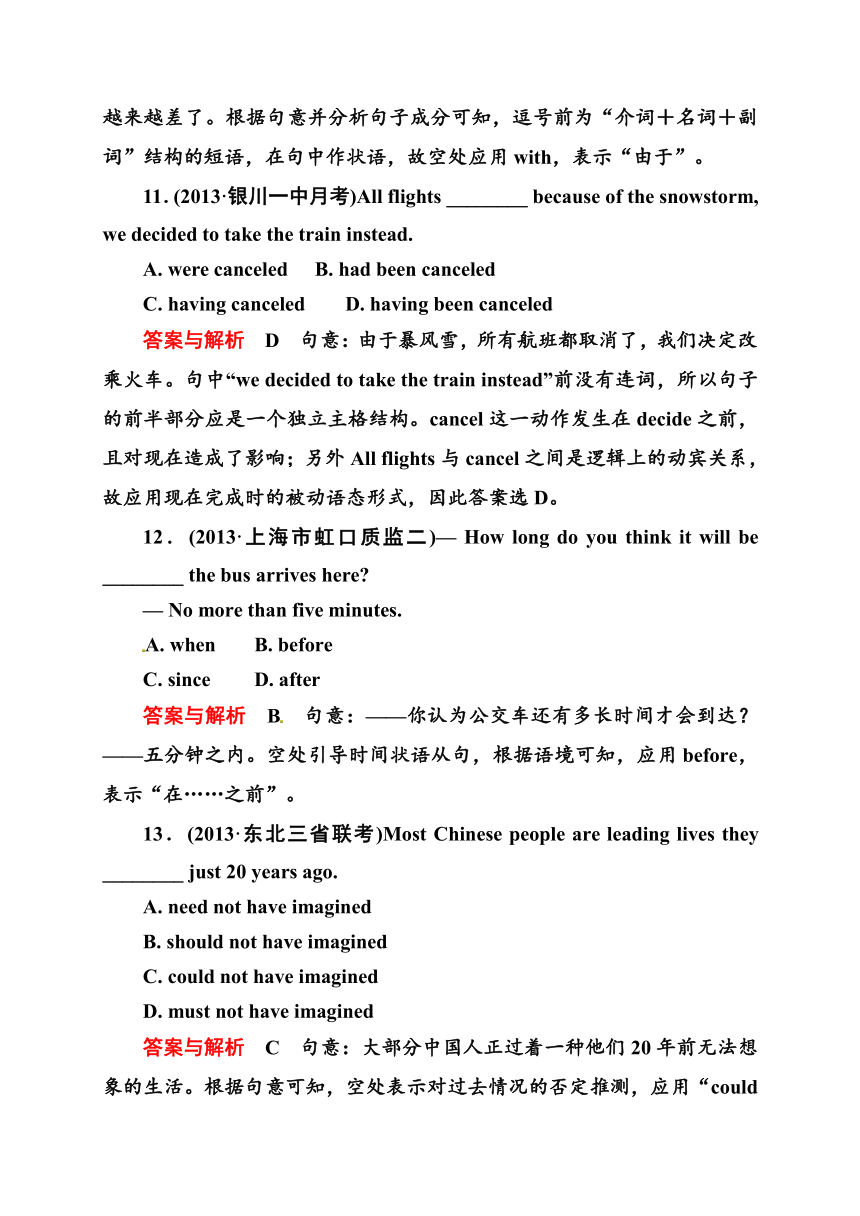
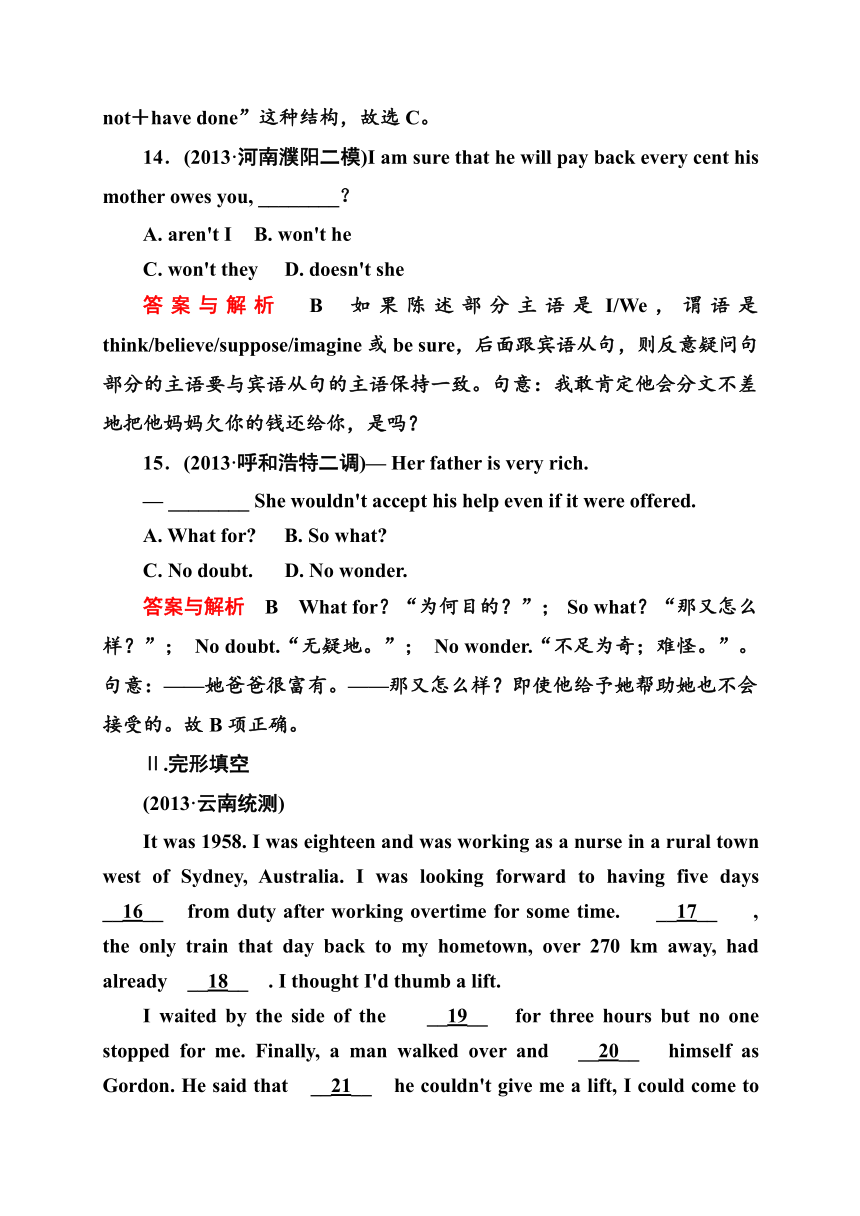
文档简介
周六 循环训练
第20练 综合测试(九)
时间:30分钟 分值:53分
Ⅰ.单项填空
1.(2013·北京海淀区二模)Dan Brown, ________ author of The Da Vinci Code, is ________ very famous American writer.
A. a; the B. the; the
C. the; a D. a; a
答案与解析 C 句意:丹·布朗,《达·芬奇密码》的作者,是一位非常著名的美国作家。根据语境可知,第一空author后有of短语作定语,故表示的是特指,应用定冠词the;而第二空表示的是泛指,意为“一位……”,应用不定冠词a。故答案选C。
2.(2013·哈尔滨质检)________ worries me the way he keeps changing his mind.
A. This B. That
C. What D. It
答案与解析 D 句意:他总是改变主意的这种行为方式让我很担心。句式分析可知,it为形式主语,真正的主语为the way,“he keeps changing his mind”为定语从句,修饰the way,从句中省略了引导词in which或that。由于主语较长,为避免头重脚轻,故用it作形式主语。故答案选D。
3.(2013·北京西城区二模)J. K. Rowling ________ writing Harry Potter at a local café because she could not afford to heat her home.
A. started B. starts
C. has started D. had started
答案与解析 A 句意:J.K.Rowling在当地的一家咖啡馆里开始写《哈利·波特》的原因是那时她无钱支付家中的供暖费用。根据“because she could not afford to heat her home”可知, start这个动作发生在过去,所以应用一般过去时。故答案选A。
4.(2013·海口调研)Hurricane Sandy's arrival and its effects ________ New York's offices being closed for three days.
A. carried out B. came up with
C. led to D. caught up with
答案与解析 C 句意:飓风桑迪的到来和影响导致纽约的政府机构关门了三天。carry out“执行;实施”;come up with“想出;提出”;lead to“导致;通向”;catch up with“跟上;赶上”。由语境可知,答案选C。
5.(2013·东北三省四市联考)I know you want to borrow money but I don't have ________ at hand myself.
A. any B. either
C. anything D. nothing
答案与解析 A 句意:我知道你想借钱,但目前我手头没钱(没有一点儿钱)。either“(两者之中)任一”; nothing“(什么也)没有”,根据语境可排除这两项; any指有范围的任何物,而anything指没有范围的任何物,根据语境可知,此处给出了“money”这一范围。故答案选A。
6.(2013·南通一模)An official said the plan had also taken migrant workers into account, ________ medical care would be provided even if they didn't have a stable job.
A. for whom B. for which
C. with whom D. with which
答案与解析 A 句意:一个官员说,这个计划把外来务工人员也考虑进去了,即使他们没有稳定的工作,也会提供给他们医疗福利。本句先行词是migrant workers,所以用whom。从句包含一个固定用法provide sth. for sb.所以介词用for。[来源:Zxxk.Com]
7.(2013·河南六市二次联考)It is said that the old pot ________ under the earth for about 1,000 years by the time it was discovered.
A. had buried B. had been buried
C. buried D. were buried
答案与解析 B 句意:据说,那个旧罐子在被发现之前已经在地下埋藏了大约一千年。这里表示在过去动作(was discovered)之前的状态,用过去完成时; bury与the old pot之间为动宾关系,故用被动语态。
8.(2013·郑州一中质量评估)________ of the danger of the stock market, he still decided to invest and suffered a big loss.
A. Warned B. Being warned
C. To be warned D. Having warned
答案与解析 A 分析句子结构可知,he与warn是逻辑上的动宾关系,所以用动词-ed形式作状语,表示让步。
9.(2013·临沂质检二)— Won't you go to the football match tonight?
— ________. I might stay at home watching its live performance on TV instead.
A. I hope not B. I'm not sure
C. I guess so D. I'd love to
答案与解析 B 句意:——难道今晚你不去看足球比赛吗?——我不确定。我可能会在家看直播。根据答语第二句可知,答话人尚不确定,故应选I'm not sure.“我不确定。”。
10.(2013·衡水一模)________ sales of cars up by 30% last year, the traffic in Beijing has become increasingly terrible.
A. With B. Since
C. For D. As
答案与解析 A 句意:去年汽车销量增长了30%,北京的交通状况越来越差了。根据句意并分析句子成分可知,逗号前为“介词+名词+副词”结构的短语,在句中作状语,故空处应用with,表示“由于”。
11.(2013·银川一中月考)All flights ________ because of the snowstorm, we decided to take the train instead.
A. were canceled B. had been canceled
C. having canceled D. having been canceled
答案与解析 D 句意:由于暴风雪,所有航班都取消了,我们决定改乘火车。句中“we decided to take the train instead”前没有连词,所以句子的前半部分应是一个独立主格结构。cancel这一动作发生在decide之前,且对现在造成了影响;另外All flights与cancel之间是逻辑上的动宾关系,故应用现在完成时的被动语态形式,因此答案选D。
12.(2013·上海市虹口质监二)— How long do you think it will be ________ the bus arrives here?
— No more than five minutes.
A. when B. before
C. since D. after
答案与解析 B 句意:——你认为公交车还有多长时间才会到达?——五分钟之内。空处引导时间状语从句,根据语境可知,应用before,表示“在……之前”。
13.(2013·东北三省联考)Most Chinese people are leading lives they ________ just 20 years ago.
A. need not have imagined
B. should not have imagined
C. could not have imagined
D. must not have imagined
答案与解析 C 句意:大部分中国人正过着一种他们20年前无法想象的生活。根据句意可知,空处表示对过去情况的否定推测,应用“could not+have done”这种结构,故选C。
14.(2013·河南濮阳二模)I am sure that he will pay back every cent his mother owes you, ________?
A. aren't I B. won't he
C. won't they D. doesn't she
答案与解析 B 如果陈述部分主语是I/We,谓语是think/believe/suppose/imagine或be sure,后面跟宾语从句,则反意疑问句部分的主语要与宾语从句的主语保持一致。句意:我敢肯定他会分文不差地把他妈妈欠你的钱还给你,是吗?
15.(2013·呼和浩特二调)— Her father is very rich.
— ________ She wouldn't accept his help even if it were offered.
A. What for? B. So what?
C. No doubt. D. No wonder.
答案与解析 B What for?“为何目的?”; So what?“那又怎么样?”; No doubt.“无疑地。”; No wonder.“不足为奇;难怪。”。句意:——她爸爸很富有。——那又怎么样?即使他给予她帮助她也不会接受的。故B项正确。[来源:学科网ZXXK]
Ⅱ.完形填空
(2013·云南统测)
It was 1958. I was eighteen and was working as a nurse in a rural town west of Sydney, Australia. I was looking forward to having five days __16__ from duty after working overtime for some time. __17__ , the only train that day back to my hometown, over 270 km away, had already __18__ . I thought I'd thumb a lift.
I waited by the side of the __19__ for three hours but no one stopped for me. Finally, a man walked over and __20__ himself as Gordon. He said that __21__ he couldn't give me a lift, I could come to his house, which was across the road, for lunch. He'd been watching me and thought I must be __22__ after standing for hours. I hesitated but he assured me I was __23__, and he also offered to help me find a __24__ home afterwards.
When we arrived at Gordon's __25__, he made us sandwiches. After lunch, he stopped a car, which took me to my hometown.
Then I got married, but my husband didn't believe in giving __26__ a ride. This made me feel __27__ when we'd pass people waiting on the roadside, as I could __28__ offer them the lift they hoped for.
Twenty-five years later, in 1983, I was driving alone to a nearby town, when I __29__ an elderly man with a small boy, standing in the glaring heat, trying to __30__ a ride. I saw my chance to repay someone for the __31__ I'd been given decades earlier. I pulled over and picked the __32__ up. I made them comfortable on the back seat and __33__ some water and sweets.
After a few minutes of small talk, the man said to me, “You haven't changed a bit, __34__ your red hair is still the same.” I couldn't __35__ where I'd met him. He then told me he was Gordon.
16.A. off B. away
C. out D. up[来源:学科网ZXXK]
17.A. Surprisingly B. Hopefully
C. Unfortunately D. Strangely
18.A. started B. left
C. delayed D. arrived
19.A. town B. station
C. railway D. highway
20.A. considered B. described
C. introduced D. named[来源:Zxxk.Com]
21.A. when B. once
C. although D. unless
22.A. tired B. thirsty
C. angry D. hungry
23.A. careful B. safe
C. young D. suspicious
24.A. lift B. way
C. train D. bicycle
25.A. kitchen B. shop
C. house D. garage
26.A. villagers B. strangers
C. relatives D. neighbours
27.A. bad B. nervous
C. excited D. anxious
28.A. ever B. still
C. never D. sometimes
29.A. recognized B. noticed
C. knew D. observed
30.A. offer B. enjoy
C. demand D. get
31.A. support B. debt
C. effort D. favour
32.A. pair B. couple
C. group D. team
33.A. exchanged B. shared
C. drank D. brought[来源:学.科.网]
34.A. even B. only
C. thus D. just
35.A. remind B. repeat
C. recommend D. recall
答案与解析
本文是一篇记叙文。一位叫Gordon的陌生人对作者进行了帮助,带作者去家里吃饭,并帮助作者搭便车。后来,作者一直想帮助别人,特别是等待搭便车的人,但是由于作者的丈夫对陌生人不信任,一直未能实现。后来,作者在一次单独驾车出行时,帮助了一位老人和孩子搭便车,而那位老人竟然就是曾经帮助作者的Gordon。
16.A 根据下文“after working overtime for some time”可知,此处表示“休5天假”。off“休假;不工作”之意,与语境相符合。
17.C 根据下文“the only train that day ... I thought I'd thumb a lift”可知,唯一可以返乡的火车已经离开,所以作者感觉自己很不幸运。因此,unfortunately符合文意。
18.B 根据下文“I thought I'd thumb a lift”可知,作者认为自己只能搭便车了。由此可推断,唯一一趟火车已经离开了,left符合语境。
19.D 作者当时在路边等着搭便车。highway意为“公路,大路”,符合句意。
20.C 一位路过的男士介绍自己是Gordon。introduce oneself as可作为短语使用,是“自称”之意。
21.C 根据下文“I could come to his house”可知,前后句为让步关系。因此,although“虽然;尽管”与此相符。
22.D 根据下文“after standing for hours”和上文“for lunch”,并结合选项可知,空格处应选hungry。
23.B 根据下文可知,Gordon请作者去他的家吃午饭。因为当时作者有点犹豫,所以对方使作者相信自己是安全的。由此可知,空格处应选safe。
24.A 根据上文第一段最后一句“I thought I'd thumb a lift.”可知,此处指的是Gordon使作者相信他也会帮助作者搭到一辆车。因此,lift符合文意。
25.C 根据上文第二段第三句“I could come to his house.”可知,作者到了Gordon的住处。house符合文意。
26.B 此处的语境与上文形成了鲜明的对比,作者的丈夫不相信陌生人,不会让他们搭便车。
27.A 从那些在路边上等待搭便车的人旁边经过时,作者心里感到难过。由此可知,bad符合文意。
28.C 作者之所以难过,是因为她从来不能帮助陌生人,让他们搭便车。在四个选项中,只有C项是表示否定的,与文意相符。
29.B 作者在一次单独驾车时,注意到了一位老人领着一个小男孩。因此,noticed符合文意。
30.D 根据上下文可知,此处指的是老人正在等待搭便车, get a ride“搭便车”,与文意相符。
31.D 根据上文可知,此处指的是作者早在几十年前被给予了帮助,所以作者在寻找机会来回报曾经被给予的帮助。favour“帮助;恩惠”,符合文意。
32.A 根据上文“an elderly man with a small boy”可知,此处指的是老人和孩子两个人。故选pair。
33.B 作者和他们一起分享(share)水和甜品。
34.A 根据上下文可知,空格处表示的是程度,前后两句为递进关系。even“甚至”,与此相符。
35.D 根据语境可知,作者一时想不起在哪里见过他。remind“提醒”; repeat“重复”; recommend“推荐;建议;劝告”; recall“回想起;记起”。根据语境可知,答案选D。
Ⅲ.阅读理解
(2013·天津卷)
Poet William Stafford once said that we are defined more by the detours (绕行路) in life than by the narrow road toward goals. I like this image. But it was quite by accident that I discovered the deep meaning of his words.
For years we made the long drive from our home in Seattle to my parents' home in Boise in nine hours. We traveled the way most people do: the fastest, shortest, easiest road, especially when I was alone with four noisy, restless kids who hate confinement (限制) and have strong opinions about everything.
Road trips felt risky, so I would drive fast, stopping only when I had to. We would stick to the freeways and arrive tired.
But then Banner, our lamb was born. He was rejected by his mama days before our planned trip to Boise. I had two choices: leave Banner with my husband, or take him with me. My husband made the decision for me.
That is how I found myself on the road with four kids, a baby lamb and nothing but my everlasting optimism to see me through. We took the country roads out of necessity. We had to stop every hour, let Banner shake out his legs and feed him. The kids chased him and one another. They'd get back in the car breathless and energized, smelling fresh from the cold air.
We explored side roads, catching grasshoppers in waist-high grass. Even if we simply looked out of the car windows at baby pigs following their mother, or fish leaping out of the water, it was better than the best ride down the freeway. Here was life, and new horizons (见识).
We eventually arrived at my parents' doorstep astonishingly fresh and full of stories.
I grew brave with the trip back home and creative with my disciplining technique. On an empty section of road, everyone started quarreling. I stopped the car, ordered all kids out and told them to meet me up ahead. I parked my car half a mile away and read my book in sweet silence.
Some road trips are by necessity fast and straight. But that trip with Banner opened our eyes to a world available to anyone adventurous enough to wander around and made me realize that a detour may uncover the best part of a journey — and the best part of yourself.
本文为总分总结构,从第二段开始通过我亲身的经历,我深深体会到了诗人威廉·斯塔福德说过的一句话。最后一段最后一句,又加深了我对这句话的理解。
36.Why did the author use to take freeways to her parents' home?
A. It was less tiring.
B. It would be faster and safer.
C. Her kids would feel less confined.
D. She felt better with other drivers nearby.
答案与解析 B 细节理解题。由第二段第二句和第三段第一句可知,B项正确。
37.The author stopped regularly on the country roads to ________.
A. relax in the fresh air
B. take a deep breath
C. take care of the lamb
D. let the kids play with Banner
答案与解析 C 细节理解题。由第五段第三句可知,C项正确。
38.What does the author discover from the trip according to Paragraph 6?
A. Freeways are where beauty hides.
B. Getting close to nature adds to the joy of life.
C. Enjoying the beauty of nature benefits one's health.
D. One should follow side roads to watch wild animals.
答案与解析 B 推理判断题。A项本身说法就不对,C项文章中未提及,D项不是作者所要表达的意思。故选B项。
39.Why did the author ask the kids to get out of the car on their way back home?
A. To give herself some time to read.
B. To order some food for them.
C. To play a game with them.
D. To let them cool down.
答案与解析 D 推理判断题。B、C两项文中未提及。A项作者读书,并不是停车的目的。由第二段最后一句和倒数第二段第二、三句知,孩子们吵闹,不安静,作者停下车来,让他们下车到前面等着我,就是让他们静下来,故选D项。
第20练 综合测试(九)
时间:30分钟 分值:53分
Ⅰ.单项填空
1.(2013·北京海淀区二模)Dan Brown, ________ author of The Da Vinci Code, is ________ very famous American writer.
A. a; the B. the; the
C. the; a D. a; a
答案与解析 C 句意:丹·布朗,《达·芬奇密码》的作者,是一位非常著名的美国作家。根据语境可知,第一空author后有of短语作定语,故表示的是特指,应用定冠词the;而第二空表示的是泛指,意为“一位……”,应用不定冠词a。故答案选C。
2.(2013·哈尔滨质检)________ worries me the way he keeps changing his mind.
A. This B. That
C. What D. It
答案与解析 D 句意:他总是改变主意的这种行为方式让我很担心。句式分析可知,it为形式主语,真正的主语为the way,“he keeps changing his mind”为定语从句,修饰the way,从句中省略了引导词in which或that。由于主语较长,为避免头重脚轻,故用it作形式主语。故答案选D。
3.(2013·北京西城区二模)J. K. Rowling ________ writing Harry Potter at a local café because she could not afford to heat her home.
A. started B. starts
C. has started D. had started
答案与解析 A 句意:J.K.Rowling在当地的一家咖啡馆里开始写《哈利·波特》的原因是那时她无钱支付家中的供暖费用。根据“because she could not afford to heat her home”可知, start这个动作发生在过去,所以应用一般过去时。故答案选A。
4.(2013·海口调研)Hurricane Sandy's arrival and its effects ________ New York's offices being closed for three days.
A. carried out B. came up with
C. led to D. caught up with
答案与解析 C 句意:飓风桑迪的到来和影响导致纽约的政府机构关门了三天。carry out“执行;实施”;come up with“想出;提出”;lead to“导致;通向”;catch up with“跟上;赶上”。由语境可知,答案选C。
5.(2013·东北三省四市联考)I know you want to borrow money but I don't have ________ at hand myself.
A. any B. either
C. anything D. nothing
答案与解析 A 句意:我知道你想借钱,但目前我手头没钱(没有一点儿钱)。either“(两者之中)任一”; nothing“(什么也)没有”,根据语境可排除这两项; any指有范围的任何物,而anything指没有范围的任何物,根据语境可知,此处给出了“money”这一范围。故答案选A。
6.(2013·南通一模)An official said the plan had also taken migrant workers into account, ________ medical care would be provided even if they didn't have a stable job.
A. for whom B. for which
C. with whom D. with which
答案与解析 A 句意:一个官员说,这个计划把外来务工人员也考虑进去了,即使他们没有稳定的工作,也会提供给他们医疗福利。本句先行词是migrant workers,所以用whom。从句包含一个固定用法provide sth. for sb.所以介词用for。[来源:Zxxk.Com]
7.(2013·河南六市二次联考)It is said that the old pot ________ under the earth for about 1,000 years by the time it was discovered.
A. had buried B. had been buried
C. buried D. were buried
答案与解析 B 句意:据说,那个旧罐子在被发现之前已经在地下埋藏了大约一千年。这里表示在过去动作(was discovered)之前的状态,用过去完成时; bury与the old pot之间为动宾关系,故用被动语态。
8.(2013·郑州一中质量评估)________ of the danger of the stock market, he still decided to invest and suffered a big loss.
A. Warned B. Being warned
C. To be warned D. Having warned
答案与解析 A 分析句子结构可知,he与warn是逻辑上的动宾关系,所以用动词-ed形式作状语,表示让步。
9.(2013·临沂质检二)— Won't you go to the football match tonight?
— ________. I might stay at home watching its live performance on TV instead.
A. I hope not B. I'm not sure
C. I guess so D. I'd love to
答案与解析 B 句意:——难道今晚你不去看足球比赛吗?——我不确定。我可能会在家看直播。根据答语第二句可知,答话人尚不确定,故应选I'm not sure.“我不确定。”。
10.(2013·衡水一模)________ sales of cars up by 30% last year, the traffic in Beijing has become increasingly terrible.
A. With B. Since
C. For D. As
答案与解析 A 句意:去年汽车销量增长了30%,北京的交通状况越来越差了。根据句意并分析句子成分可知,逗号前为“介词+名词+副词”结构的短语,在句中作状语,故空处应用with,表示“由于”。
11.(2013·银川一中月考)All flights ________ because of the snowstorm, we decided to take the train instead.
A. were canceled B. had been canceled
C. having canceled D. having been canceled
答案与解析 D 句意:由于暴风雪,所有航班都取消了,我们决定改乘火车。句中“we decided to take the train instead”前没有连词,所以句子的前半部分应是一个独立主格结构。cancel这一动作发生在decide之前,且对现在造成了影响;另外All flights与cancel之间是逻辑上的动宾关系,故应用现在完成时的被动语态形式,因此答案选D。
12.(2013·上海市虹口质监二)— How long do you think it will be ________ the bus arrives here?
— No more than five minutes.
A. when B. before
C. since D. after
答案与解析 B 句意:——你认为公交车还有多长时间才会到达?——五分钟之内。空处引导时间状语从句,根据语境可知,应用before,表示“在……之前”。
13.(2013·东北三省联考)Most Chinese people are leading lives they ________ just 20 years ago.
A. need not have imagined
B. should not have imagined
C. could not have imagined
D. must not have imagined
答案与解析 C 句意:大部分中国人正过着一种他们20年前无法想象的生活。根据句意可知,空处表示对过去情况的否定推测,应用“could not+have done”这种结构,故选C。
14.(2013·河南濮阳二模)I am sure that he will pay back every cent his mother owes you, ________?
A. aren't I B. won't he
C. won't they D. doesn't she
答案与解析 B 如果陈述部分主语是I/We,谓语是think/believe/suppose/imagine或be sure,后面跟宾语从句,则反意疑问句部分的主语要与宾语从句的主语保持一致。句意:我敢肯定他会分文不差地把他妈妈欠你的钱还给你,是吗?
15.(2013·呼和浩特二调)— Her father is very rich.
— ________ She wouldn't accept his help even if it were offered.
A. What for? B. So what?
C. No doubt. D. No wonder.
答案与解析 B What for?“为何目的?”; So what?“那又怎么样?”; No doubt.“无疑地。”; No wonder.“不足为奇;难怪。”。句意:——她爸爸很富有。——那又怎么样?即使他给予她帮助她也不会接受的。故B项正确。[来源:学科网ZXXK]
Ⅱ.完形填空
(2013·云南统测)
It was 1958. I was eighteen and was working as a nurse in a rural town west of Sydney, Australia. I was looking forward to having five days __16__ from duty after working overtime for some time. __17__ , the only train that day back to my hometown, over 270 km away, had already __18__ . I thought I'd thumb a lift.
I waited by the side of the __19__ for three hours but no one stopped for me. Finally, a man walked over and __20__ himself as Gordon. He said that __21__ he couldn't give me a lift, I could come to his house, which was across the road, for lunch. He'd been watching me and thought I must be __22__ after standing for hours. I hesitated but he assured me I was __23__, and he also offered to help me find a __24__ home afterwards.
When we arrived at Gordon's __25__, he made us sandwiches. After lunch, he stopped a car, which took me to my hometown.
Then I got married, but my husband didn't believe in giving __26__ a ride. This made me feel __27__ when we'd pass people waiting on the roadside, as I could __28__ offer them the lift they hoped for.
Twenty-five years later, in 1983, I was driving alone to a nearby town, when I __29__ an elderly man with a small boy, standing in the glaring heat, trying to __30__ a ride. I saw my chance to repay someone for the __31__ I'd been given decades earlier. I pulled over and picked the __32__ up. I made them comfortable on the back seat and __33__ some water and sweets.
After a few minutes of small talk, the man said to me, “You haven't changed a bit, __34__ your red hair is still the same.” I couldn't __35__ where I'd met him. He then told me he was Gordon.
16.A. off B. away
C. out D. up[来源:学科网ZXXK]
17.A. Surprisingly B. Hopefully
C. Unfortunately D. Strangely
18.A. started B. left
C. delayed D. arrived
19.A. town B. station
C. railway D. highway
20.A. considered B. described
C. introduced D. named[来源:Zxxk.Com]
21.A. when B. once
C. although D. unless
22.A. tired B. thirsty
C. angry D. hungry
23.A. careful B. safe
C. young D. suspicious
24.A. lift B. way
C. train D. bicycle
25.A. kitchen B. shop
C. house D. garage
26.A. villagers B. strangers
C. relatives D. neighbours
27.A. bad B. nervous
C. excited D. anxious
28.A. ever B. still
C. never D. sometimes
29.A. recognized B. noticed
C. knew D. observed
30.A. offer B. enjoy
C. demand D. get
31.A. support B. debt
C. effort D. favour
32.A. pair B. couple
C. group D. team
33.A. exchanged B. shared
C. drank D. brought[来源:学.科.网]
34.A. even B. only
C. thus D. just
35.A. remind B. repeat
C. recommend D. recall
答案与解析
本文是一篇记叙文。一位叫Gordon的陌生人对作者进行了帮助,带作者去家里吃饭,并帮助作者搭便车。后来,作者一直想帮助别人,特别是等待搭便车的人,但是由于作者的丈夫对陌生人不信任,一直未能实现。后来,作者在一次单独驾车出行时,帮助了一位老人和孩子搭便车,而那位老人竟然就是曾经帮助作者的Gordon。
16.A 根据下文“after working overtime for some time”可知,此处表示“休5天假”。off“休假;不工作”之意,与语境相符合。
17.C 根据下文“the only train that day ... I thought I'd thumb a lift”可知,唯一可以返乡的火车已经离开,所以作者感觉自己很不幸运。因此,unfortunately符合文意。
18.B 根据下文“I thought I'd thumb a lift”可知,作者认为自己只能搭便车了。由此可推断,唯一一趟火车已经离开了,left符合语境。
19.D 作者当时在路边等着搭便车。highway意为“公路,大路”,符合句意。
20.C 一位路过的男士介绍自己是Gordon。introduce oneself as可作为短语使用,是“自称”之意。
21.C 根据下文“I could come to his house”可知,前后句为让步关系。因此,although“虽然;尽管”与此相符。
22.D 根据下文“after standing for hours”和上文“for lunch”,并结合选项可知,空格处应选hungry。
23.B 根据下文可知,Gordon请作者去他的家吃午饭。因为当时作者有点犹豫,所以对方使作者相信自己是安全的。由此可知,空格处应选safe。
24.A 根据上文第一段最后一句“I thought I'd thumb a lift.”可知,此处指的是Gordon使作者相信他也会帮助作者搭到一辆车。因此,lift符合文意。
25.C 根据上文第二段第三句“I could come to his house.”可知,作者到了Gordon的住处。house符合文意。
26.B 此处的语境与上文形成了鲜明的对比,作者的丈夫不相信陌生人,不会让他们搭便车。
27.A 从那些在路边上等待搭便车的人旁边经过时,作者心里感到难过。由此可知,bad符合文意。
28.C 作者之所以难过,是因为她从来不能帮助陌生人,让他们搭便车。在四个选项中,只有C项是表示否定的,与文意相符。
29.B 作者在一次单独驾车时,注意到了一位老人领着一个小男孩。因此,noticed符合文意。
30.D 根据上下文可知,此处指的是老人正在等待搭便车, get a ride“搭便车”,与文意相符。
31.D 根据上文可知,此处指的是作者早在几十年前被给予了帮助,所以作者在寻找机会来回报曾经被给予的帮助。favour“帮助;恩惠”,符合文意。
32.A 根据上文“an elderly man with a small boy”可知,此处指的是老人和孩子两个人。故选pair。
33.B 作者和他们一起分享(share)水和甜品。
34.A 根据上下文可知,空格处表示的是程度,前后两句为递进关系。even“甚至”,与此相符。
35.D 根据语境可知,作者一时想不起在哪里见过他。remind“提醒”; repeat“重复”; recommend“推荐;建议;劝告”; recall“回想起;记起”。根据语境可知,答案选D。
Ⅲ.阅读理解
(2013·天津卷)
Poet William Stafford once said that we are defined more by the detours (绕行路) in life than by the narrow road toward goals. I like this image. But it was quite by accident that I discovered the deep meaning of his words.
For years we made the long drive from our home in Seattle to my parents' home in Boise in nine hours. We traveled the way most people do: the fastest, shortest, easiest road, especially when I was alone with four noisy, restless kids who hate confinement (限制) and have strong opinions about everything.
Road trips felt risky, so I would drive fast, stopping only when I had to. We would stick to the freeways and arrive tired.
But then Banner, our lamb was born. He was rejected by his mama days before our planned trip to Boise. I had two choices: leave Banner with my husband, or take him with me. My husband made the decision for me.
That is how I found myself on the road with four kids, a baby lamb and nothing but my everlasting optimism to see me through. We took the country roads out of necessity. We had to stop every hour, let Banner shake out his legs and feed him. The kids chased him and one another. They'd get back in the car breathless and energized, smelling fresh from the cold air.
We explored side roads, catching grasshoppers in waist-high grass. Even if we simply looked out of the car windows at baby pigs following their mother, or fish leaping out of the water, it was better than the best ride down the freeway. Here was life, and new horizons (见识).
We eventually arrived at my parents' doorstep astonishingly fresh and full of stories.
I grew brave with the trip back home and creative with my disciplining technique. On an empty section of road, everyone started quarreling. I stopped the car, ordered all kids out and told them to meet me up ahead. I parked my car half a mile away and read my book in sweet silence.
Some road trips are by necessity fast and straight. But that trip with Banner opened our eyes to a world available to anyone adventurous enough to wander around and made me realize that a detour may uncover the best part of a journey — and the best part of yourself.
本文为总分总结构,从第二段开始通过我亲身的经历,我深深体会到了诗人威廉·斯塔福德说过的一句话。最后一段最后一句,又加深了我对这句话的理解。
36.Why did the author use to take freeways to her parents' home?
A. It was less tiring.
B. It would be faster and safer.
C. Her kids would feel less confined.
D. She felt better with other drivers nearby.
答案与解析 B 细节理解题。由第二段第二句和第三段第一句可知,B项正确。
37.The author stopped regularly on the country roads to ________.
A. relax in the fresh air
B. take a deep breath
C. take care of the lamb
D. let the kids play with Banner
答案与解析 C 细节理解题。由第五段第三句可知,C项正确。
38.What does the author discover from the trip according to Paragraph 6?
A. Freeways are where beauty hides.
B. Getting close to nature adds to the joy of life.
C. Enjoying the beauty of nature benefits one's health.
D. One should follow side roads to watch wild animals.
答案与解析 B 推理判断题。A项本身说法就不对,C项文章中未提及,D项不是作者所要表达的意思。故选B项。
39.Why did the author ask the kids to get out of the car on their way back home?
A. To give herself some time to read.
B. To order some food for them.
C. To play a game with them.
D. To let them cool down.
答案与解析 D 推理判断题。B、C两项文中未提及。A项作者读书,并不是停车的目的。由第二段最后一句和倒数第二段第二、三句知,孩子们吵闹,不安静,作者停下车来,让他们下车到前面等着我,就是让他们静下来,故选D项。
